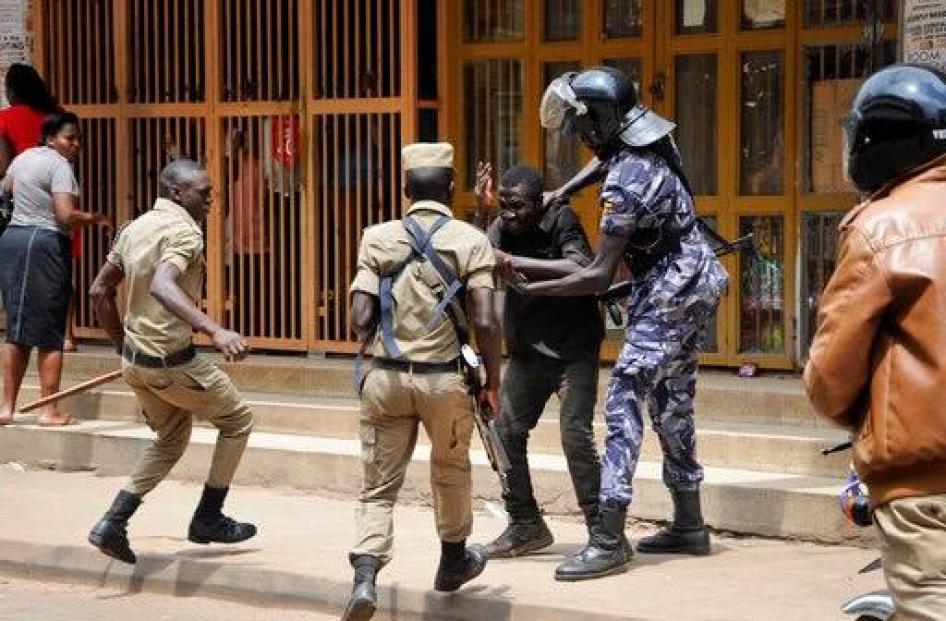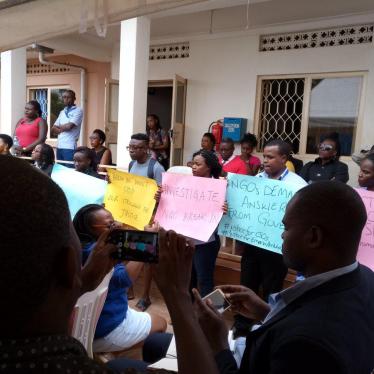Ugandan police and military leadership should immediately order a stop to attacks on the media and ensure that military and police fully respect and protect the rights of all protesters.
On August 13, 2018, Ugandan police and military arrested and beat six opposition members of parliament, at least two journalists, and 28 other people in advance of the August 15 by-elections in the northwestern town of Arua. In recent days, protesters took to the streets in Kampala, Mityana, and other areas to decry the arrests and violence.
“Beating and arresting journalists is evidence the authorities want to cover up security forces’ conduct and curtail the public’s access to information,” said Oryem Nyeko, Africa researcher at Human Rights Watch. “Ugandan security forces should show restraint while policing protests, acting lawfully and with full respect for human rights law, and let journalists do their job.”
Yasiin Kawuma, a driver for Robert Kyagulanyi, an independent parliament member also known as Bobi Wine, was shot and killed on August 13 while in the car. Police say Kawuma was killed while security forces sought to contain clashes following an alleged attack on President Yoweri Museveni’s convoy during the Arua by-election campaign. Some have disputed the police’s version of events, saying that Kawuma was not near the convoy when he was killed.
Police arrested two journalists from NTV, Herbert Zziwa and Ronald Muwanga, as they reported live from the area where Kawuma was killed. The journalists were charged with malicious damage to property and incitement of violence. They told the media that security forces tied them up and beat them before they were charged and released on bond in the town of Gulu.
The police arrested the opposition parliament members, including Kyagulanyi, and the others the same day. Lawyers representing them in court appearances said their clients were beaten by security forces. At least six people who remain detained in Gulu have serious injuries, including one woman who was “bleeding from her private parts” as a result, her lawyer said.
Another parliament member, Francis Zaake, is reported to have also been arrested in Arua – but not charged – and later taken, unconscious, by “men in military uniform” to a hospital in Kampala, where he is now receiving treatment.
Military prosecutors charged Kyagulanyi with unlawful possession of firearms and ammunition before a military court in Gulu, after he had been held incommunicado for three days. His lawyers and his family – the only people allowed access to him – said that members of the military’s Special Forces Command beat and severely injured him.
Kyagulanyi’s wife released a statement saying that Kyagulanyi “has many wounds including one on his ear. He seems to have been punched many times on the face. He cannot walk. He was carried into the room where we saw him. He cannot sit straight. He speaks with difficulty and has a lot of pain breathing.”
In response to reports of the arrests and beatings in Arua, particularly the arrest of Kyagulanyi, protests have engulfed Kampala and other parts of Uganda. Riot police fired teargas and live ammunition at protests in Kamwokya, a suburb of Kampala, on August 16, allegedly to disperse protesters, and arrested several people.
On August 19, protests erupted in Mityana, 70 kilometers from Kampala, with at least one person killed and others injured. Protests took place across Kampala on August 20.
Security forces have arrested journalists covering live events and forced them to delete footage, media reported. Among them was James Akena, a prominent Reuters photojournalist. Soldiers arrested and beat him and took his equipment as he sought to cover the demonstrations on August 20. He was later released.
The government should immediately release Kyangulanyi and, if there is credible evidence of his wrongdoing, pursue any charges before civilian courts. The circumstances of his arrest during the by-election campaigns, his effective disappearance for three days, his brutal mistreatment, and detention by the military call into serious doubt whether there is any merit in the government’s allegations against him. His mistreatment suggests that it is no more than vicious retaliation against a popular opposition leader.
The government needs to guarantee effective, independent investigations into the killing of Kawuma, the severe mistreatment of all those arrested in Arua, and the ongoing attacks on journalists covering events, Human Rights Watch said.
The African Commission has called on Uganda in 2006 and 2009 to stop prosecuting civilians before military courts, but the military wrongfully persists in maintaining a monopoly on prosecutions for gun crime.
Freedom of assembly as well as freedom of expression and of the media, are guaranteed by articles 19 and 21 of the International Covenant on Civil and Political Rights, articles 9 and 11 of the African Charter on Human and Peoples’ Rights, and article 29 of the Ugandan Constitution. Restrictions on such freedoms to prevent direct incitement to violence are permissible under international law but must be necessary and proportionate to prevent such incitement and must not be arbitrary. Ugandan law prohibits torture and inhumane and degrading treatment and explicitly provides for the prosecution of officials responsible for it.
“Without greater government transparency into the killing of Kawuma and the mistreatment of those arrested in Arua, including Kyagulanyi, these protests are likely to continue,” Nyeko said. “Security forces should respect and protect Ugandans rights to free assembly and speech and stop the use of unlawful force and arbitrary arrests to quell the national outrage over brutal treatment by security forces.”








